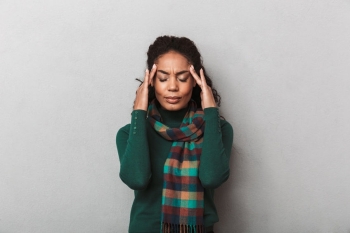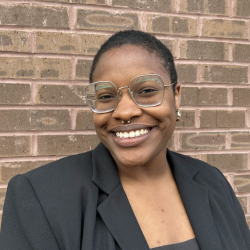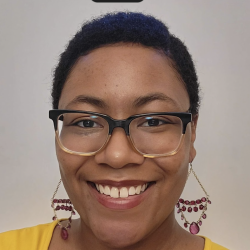
When we think about the Strong Black Woman, one of the struggles that plagues this badge of honor is the idea of balancing strength and vulnerability in life and relationships. The old idea of the strong black woman possess characteristics that are nearly impossible to obtain and feeds into the struggle that leaves the woman feeling defeated and sometimes overwhelmed. Some woman question themselves as a “real woman” if they start to feel as if they can't do it all (homemaker, money maker, successful relationship, successful career, successful mother, outstanding friend, wonderful child, etc). Redefining the perception of a strong black woman could be helpful to create a new perception of the strong black woman that is capable of balancing vulnerability and strength which in turn can guide the black woman into a healthier view that will allow her to accept her decisions and understand that it is okay to have imperfections. I imaging that the side effects of the old version of the strong black woman, and its impossible standards, can create rifts in the modern woman’s intimate relationship. The idea of taking on the world solo can create distance between you and your partner and could make your partner feel less valued in your relationship.
If you can relate to the old idea of being this type of strong black woman, here are some questions to consider: What happens when you are in a relationship with a man that does not fit her standard? Have you ever experienced being in a relationship with someone that you just felt was not on your level or did not meet your expectations? What was that like for you? How did you feel about yourself? How did you make him feel? What do you value most in your partner? These are questions that will help you start to uncover the underlying feelings you have about your partner as well as challenge the idealized strong Black woman perception.
This idea of the strong black woman in a relationship can take away from you achieving fulfillment in your intimate relationship. Here are some traits and actions that personify the modern woman’s strength in her relationship:
- Telling your partner you do not need their help because you believe that you are able to manage on your own when in reality you could use an extra hand
- Not having the ability to attend to your partner's needs due to over exhaustion and continuously tending to others
- Realizing that you neglect yourself often and eventually tend to yourself more than you do your partner
- Taking on the superwomen complex which in turn can allow you to become less empathetic to your partner in the sense that they should be just as strong as you present yourself to be
- Being afraid to trust that your partner will be receptive to your vulnerabilities and know how to help you even though you have experienced in the past that strong people are left to fend for themselves
- Not giving up control in fear that you will lose yourself in the process. For example, controlling every aspect of the relationship such as funds, outings, language used, movies watched, decisions, and even the consideration of your partner's suggestions and direction (especially when they are good suggestions) to maintain the perception that you can handle it all and control your world around you
- Not being vulnerable in the bedroom (bringing fears, criticisms, and rejection in experience)
- Being in constant combat mode when interacting with your partner by either fearing that your will lose your voice or that you will be controlled
Can you relate to any of these statements? If you can, consider where your responses stems from. Are you afraid of allowing yourself to lower your defenses because you fear rejection, criticisms, judgments, loss of who you think you should be and how you should respond, or the idea that your partner cannot get the best of you if they don't see you cry and be vulnerable toward them?
Not only can the lack of vulnerability have negative effects on a romantic relationship, it could also have devastating effects on children. I imagine that negating expressed vulnerability and emotions may create an unrealistic representation of how to handle demanding or emotional interactions. Due to children learning by observation, they too may run the risk of developing an off balanced manner to handle life and their future romantic relationships.
The African American woman that finds herself holding on to her defenses and lack of vulnerability could use a new perspective that will allow them to open up and receive help and become closer to their partner by learning how to balance strength with vulnerability. To know that the weight of the world does not need to be carried all on their shoulders may help shift their perspective and allow closer intimate relationships and a heather disposition in daily life. To start your journey in becoming more vulnerable, try these options:
Consider why strength is important to you and your happiness
- Understand how you learned about being a “strong black woman” and the stereotypes accompanying it
- Allow yourself to ask for help when needed
- Tap into your emotions by identifying and labeling what you are experiencing when you are challenged with an emotional situation
- Give yourself a break and participate in activities that promote your physical, mental, and spiritual well-being such as exercising, yoga, and meditation
- Know that it is okay for your to take a break and tend to yourself when needed
- Allow yourself to leave your negative thoughts and dispositions out of the intimate moments with your partner...if they are with you they perhaps are not thinking about the negative things that you may be thinking about
- Tell your partner when they are pleasing you and how they are doing so
- Tell your partner if you are not pleased and have a non-judgmental dialogue about what you like and vice versa
- Ask your partner how you can please them and genuinely respond to the feedback
- Consider how you can balance taking care of yourself, family, and work/career with knowing that sometimes you may be exhausted or need a reprieve...and that is okay
- Do allow your partner to love you and accept their help if needed
Being a strong black woman is more than the facade of strength but, in my opinion, encompasses the ability to not only portray strength during tough experiences but also to yield to vulnerabilities and knowing that great strength is shown in parting the defenses and revealing your true self. If you find that you are experiencing trouble becoming vulnerable, allow me to help you by calling The Center for Growth at 215 922 5683 x 100 or feel free to self schedule an InPerson or Virtual Counseling Session today. We do video counseling and therapy for people living in PA, NJ, VA, NM, GA, FL and we have physical offices in Society Hill Therapy Office in Philadelphia PA, Art Museum Therapy Office in Philadelphia PA, Mechanicsville Therapy Office in VA, Ocean City Therapy Office in NJ and Santa Fe Therapy Office in NM.























